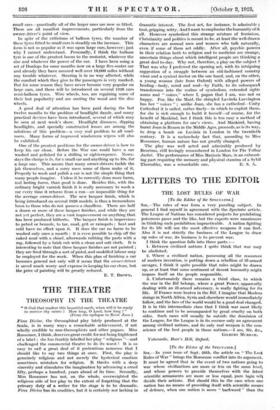THE THEATRE THEOSOPHY IN THE THEATRE o God that madest
this beautiful earth, when will it be ready
to receive thy saints ? How long, 0 Lord, how long ? "
(From the epilogue to Saint Joan.) Fires Divine, the theosophical play lately produced at the Scala, is in many ways a remarkable achievement, if not wholly credible to non-theosophists and other pagans. Miss Rossomer, I think, deserves great credit for not being frightened of a label ; she has frankly labelled her play" religious "—and challenged the commercial theatre to do its worst ! It is so easy to call a great deal of it pretentious nonsense that I should like to say two things at once. First, the play is genuinely religious and not merely the hysterical emotion sometimes mistaken for religion. It throbs with a deep sincerity and stimulates the imagination by advancing a creed fifty, perhaps a hundred, years ahead of its time. Secondly, Miss Rossomer has not, on the whole, overweighted the religious side of her play to the extent of forgetting that the primary duty of a writer for the stage is to 1be dramatic. Fires Divine has its crudities, but it is certainly not lacking in dramatic interest. The first act, for instance, is admirable ; taut, gripping, witty. And I want to emphasize the humanity of it all. However symbolical this strange mixture of feminism, Christianity and politics is meant to be, at least the well-drawn characters are normal men and women who talk naturally, even if some of them act oddly. After all, psychic powers In their relation both to religion and to medicine are strange, uncertain things about which intelligent people are thinking a great deal to-day. Why not, therefore, a play on the subject ? That was why I preferred the opening act, with its intriguing suggestion of a struggle between an old-fashioned country vicar and a cynical doctor on the one hand, and, on the other, a young woman (late from Oxford) with alleged powers of healing—body, mind and soul—by Faith, to its subsequent transference into the realms of symbolism, extended sight, auras and "voices," where I, pagan that I am, was not so happy. For, like the Maid, the shingled Lavinda Laryington has her " voices " ; unlike Joan, she has a cathedral—Unity Cathedral it is called, rather finely—in which to exploit them, for she is rich enough to build it herself—of course, for the benefit of Mankind, but I think this is too easy a method of obtaining a platform for one's views. And Mankind, having burnt Joan in Rouen in the Middle Ages, proceeds, as is its way, to drop a bomb on Lavinia in London in the twentieth century. It is a melancholy fact that, according to Miss Rossomer, human nature has not greatly changed.
The play was well acted and admirably produced by Benrimo, still lovingly remembered in London for The Yellow Jacket. The performance of Miss Marjorie Mars, in an exhaust- ing part requiring tile memory and physical stamina of a Sybil Thorndike, was a remarkable one. E. S. A.


























































 Previous page
Previous page